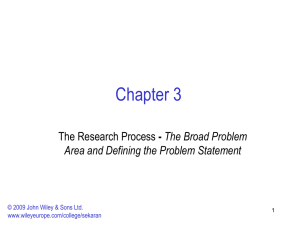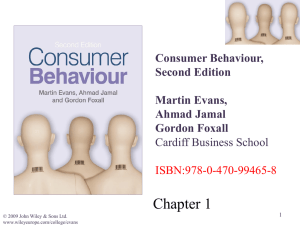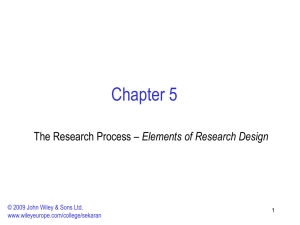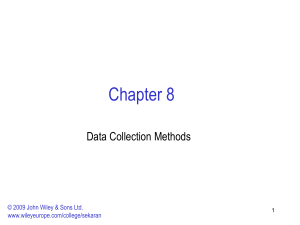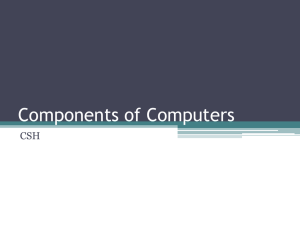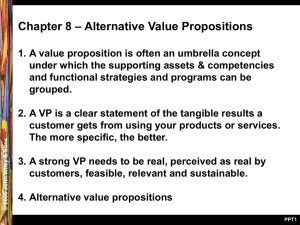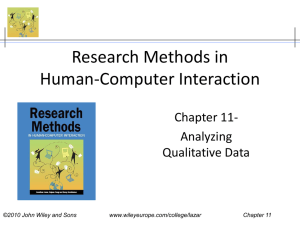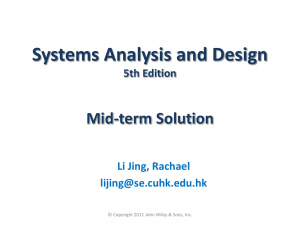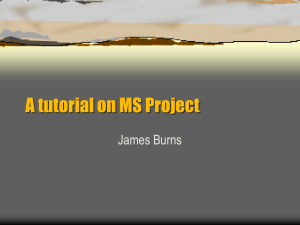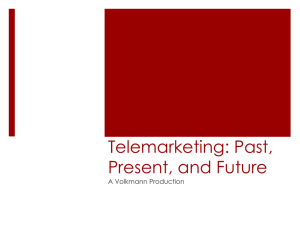Attention
advertisement
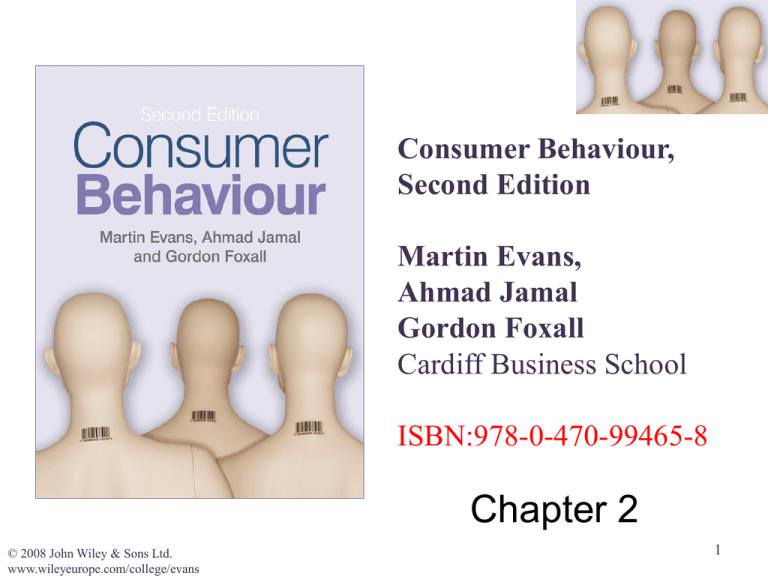
Consumer Behaviour, Second Edition Martin Evans, Ahmad Jamal Gordon Foxall Cardiff Business School ISBN:978-0-470-99465-8 Chapter 2 © 2008 John Wiley & Sons Ltd. www.wileyeurope.com/college/evans 1 Chapter 2 Consumer Responses to Marketing Actions: 1 Exposure, Attention, Perception © 2009 John Wiley & Sons Ltd. www.wileyeurope.com/college/evans 2 Chapter Objectives • Integrate the application of concepts from psychology within the first stages of a model of how consumers respond to marketing activity • Explain why consumer exposure to marketing is selective and suggest ways for marketers to overcome this • Examine ways of creating favourable conditions for consumers to attend to the marketing message/offering • Apply some of the principles of the psychology of perception to increase the likelihood that consumers will interpret the message/offering in the intended manner © 2009 John Wiley & Sons Ltd. www.wileyeurope.com/college/evans 3 Sequential Model of Marketing Post purchase Action Attitude Learning Perception Attention Exposure © 2009 John Wiley & Sons Ltd. www.wileyeurope.com/college/evans 4 Sequential Models of Marketing Attention Interest Desire Action AIDA Tosdal, 1925 St. Elmo Lewis circa 1990 This one, by Lavidge and Steiner (1961): Awareness-knowledge-linking-preference-conviction-purchase Referred to as ‘hierarchy of effects’ models by Palda (1968) © 2009 John Wiley & Sons Ltd. www.wileyeurope.com/college/evans 5 Exposure “… reflects the process by which the consumer comes into contact with a stimulus” (Hoyer & MacInnis, 2008) * Marketing stimuli * Factors influencing exposure Position of an ad Product distribution Shelf placement *Selective exposure Zipping Zapping *Measuring exposure © 2009 John Wiley & Sons Ltd. www.wileyeurope.com/college/evans 6 TGI Example: Bottled Lager 1. Do you ever drink it either in home (your own or someone else’s) or elsewhere? Yes No No. of Users Penetration 2. How many half pint bottles have you drunk? In-home Elsewhere 10 or more in last WEEK………… 7,8 or 9 in last WEEK………………. 5 or 6 in last WEEK………………. 3 or 4 in last WEEK………………. 1 or 2 in last WEEK……….. 1 or more in last MONTH……………. None in last MONTH……………. 3. Which brands do you drink? Most Often Others Amstel………………………………… Becks…………………………. Budweiser Budvar………………………… Carling………………………. © 2009 John Wiley & Sons Ltd. www.wileyeurope.com/college/evans Types of Users Heavy Medium Light No. of Users Brand Loyalty Brand Repertoire Solus Users 7 TGI for Media Decisions © 2009 John Wiley & Sons Ltd. www.wileyeurope.com/college/evans 8 TGI for Media Decisions © 2009 John Wiley & Sons Ltd. www.wileyeurope.com/college/evans 9 Exposure: BARB Panel Data © 2009 John Wiley & Sons Ltd. www.wileyeurope.com/college/evans http://www.barb.co.uk 10 BARB – TV Advertising Consumer Panels Profile of household watching different channel/programmes and ads, and when © 2009 John Wiley & Sons Ltd. www.wileyeurope.com/college/evans 11 Attention “…the process by which we devote mental activity to a stimulus…necessary for information to be processed…activate our senses.” (Hoyer & MacInnis, 2008) UK: 2000 marketing messages per day, 5% noticed Message qualities to increase attention: Novelty, colour, movement, participant, easy to process 12 © 2009 John Wiley & Sons Ltd. www.wileyeurope.com/college/evans Attention: Movement • Movement E.g., film ads, video in mail shots, even stimulating movement in static ads BMW: The simulation of movement in print advertising to attract attention: © 2009 John Wiley & Sons Ltd. www.wileyeurope.com/college/evans Source: BMW. Image Courtesy of The Advertising Archives 13 Attention: Novelty • Two cars glued to a poster, this was advertising Araldite glue, not Ford Source: Huntsman LLC. Image Courtesy of the Advertising Archives © 2009 John Wiley & Sons Ltd. www.wileyeurope.com/college/evans 14 Attention: Novelty Schema discrepancy: When the contents of a marketing communication message are different from generally expected beliefs, attitudes and/or behaviours, then they are likely to be perceived as incongruent, followed by feelings of surprise. Alden et al. (2000): TV advertisement may first depict a generally familiar situation to consumers (e.g. people drinking beer in a pub) and then show an unusual event (such as the slamming of the door by a stranger). This increases the effect of incongruity on surprise and thereby gains consumer attention. © 2009 John Wiley & Sons Ltd. www.wileyeurope.com/college/evans 15 Attention: Novelty & Size For more, see: http://www.russellsigns.co.uk/ © 2009 John Wiley & Sons Ltd. www.wileyeurope.com/college/evans 16 Attention: Novelty & Interaction For more, see: http://www.russellsigns.co.uk/ © 2009 John Wiley & Sons Ltd. www.wileyeurope.com/college/evans 17 Attention: Novelty • Ambiguous/participation: the message needs some (however small) mental effort to solve the puzzle © 2009 John Wiley & Sons Ltd. www.wileyeurope.com/college/evans 18 Attention: Novelty • Holographic projection – window and in-store displays can grab attention © 2009 John Wiley & Sons Ltd. www.wileyeurope.com/college/evans 19 Attention: Novelty This Clorox ad attracts consumers’ attention because of its unexpectedness. One does not expect to see a shirt pouring bleach on itself. © 2008 The Clorox Company. Reprinted with permission. Photo: Giblin + James © 2009 John Wiley & Sons Ltd. www.wileyeurope.com/college/evans 20 Attention: Colour Warm colours – reds/yellows, advance toward us & enlarge the item/message Even Virgin’s in-house guide starts with the statement ‘Red is the lifeblood of our look’ © 2009 John Wiley & Sons Ltd. www.wileyeurope.com/college/evans 21 Interactive Digital Media © 2009 John Wiley & Sons Ltd. www.wileyeurope.com/college/evans 22 Attention: Participation 1st Interactive poster in UK: Pretty Polly Bus Shelters: imagine 14 yr old lads on a Friday night & this… © Miles Calcraft Briginshaw Duffy & Pretty Polly. Reproduced with permissio © 2009 John Wiley & Sons Ltd. www.wileyeurope.com/college/evans 23 Attention: Easy to Process This Wishbone Bountiful ad is easy for consumers to process. It demonstrates the vegetables loaded into the salad dressing visually (concretely) and with little competing information. © 2009 John Wiley & Sons Ltd. www.wileyeurope.com/college/evans WISH-BONE and BOUNTIFULS are trademarks of Unilever. Used 24 with permission. Attention Generates Perception occurs when stimuli are registered by one of our five senses: vision, hearing, taste, smell, and touch. Perceiving Through: Illustration Vision Use of colour/product/logo designs is important Sound Music soundtracks to TV advertisements can affect how the advertising message itself is interpreted; Use of fast music in-store to speed up the momentum of shopping; Pleasant music likely to arouse positive emotions. Touch Not well researched, but North Europeans not as tactile as South Europeans (important for face to face sales); Consumers like to touch fabrics (fabric swatches in fashion catalogues) and this can create problems for on-line marketers Taste Blind tests show importance of brand image Smell Aroma (synthetic or real) of bread baking in store to suggest the bread is really fresh; Palm trees in travel agents to conjure up nostalgic memories of holidays in warm climates © 2009 John Wiley & Sons Ltd. www.wileyeurope.com/college/evans 26 Five Senses Ice Cream © 2009 John Wiley & Sons Ltd. www.wileyeurope.com/college/evans Reproduced by permission of Unilever UK 27 References Parsons & Conroy (2006) Sensory Stimuli and E-tailers, Journal of Consumer Behaviour 5.1 Attention: www.russellsigns.co.uk/ Gestalt perception: http://www.cultsock.ndirect.co.uk/MUHome/cshtml/perception/ percep4.html Colour in marketing: http://www.web-designuk.biz/web_design/psychology_color_marketing.htm http://www.infoplease.com/spot/colors1.html © 2009 John Wiley & Sons Ltd. www.wileyeurope.com/college/evans 28 References Subliminal perception: http://www.arts.uwaterloo.ca/~pmerikle/papers/SubliminalPerc eption.html http://www.csicop.org/si/9204/subliminal-perception.html © 2009 John Wiley & Sons Ltd. www.wileyeurope.com/college/evans 29
